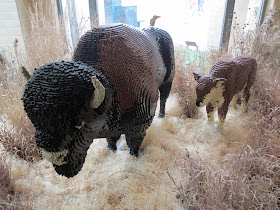Silphium
Every July I watch eagerly a certain country graveyard that I pass in driving to and from my farm. It is time for a prairie birthday, and in one corner of this graveyard lives a surviving celebrant of that once important event.It is an ordinary graveyard, bordered by the usual spruces, and studded with the usual pink granite or white marble headstones, each with the usual Sunday bouquet of red or pink geraniums. It is extraordinary only in being triangular instead of square, and in harboring, within the sharp angle of its fence, a pin-point remnant of the native prairie on which the graveyard was established in the 1840's. Heretofore unreachable by sythe or mower, this yard-square relic of original Wisconsin gives birth, each July, to a man-high stalk of compass plant or cutleaf Silphium, spangled with saucer-sized yellow blooms resembling sunflowers. It is the sole remnant of this plant along this highway, and perhaps the sole remnant in the western half of our county. What a thousand acres of Silphiums looked like when they tickled the bellies of the buffalo is a question never again to be answered, and perhaps not even asked.
This year I found the Silphium in first bloom on 24 July, a week later than usual; during the last six years the average date was 15 July.
When I passed the graveyard again on 3 August, the fence had been removed by a road crew, and the Silphium cut. It is easy now to predict the future; for a few years my Silphium will try in vain to rise above the mowing machine, and then it will die. With it will die the prairie epoch.
The Highway Department says that 100,000 cars pass yearly over this route during the three summer months when the Silphium is in bloom. In them must ride at least 100,000 people who have 'taken' what is called history, and perhaps 25,000 who have 'taken' what is called botany. Yet I doubt whether a dozen have seen the Silphium, and of these hardly one will notice its demise. If I were to tell a preacher of the adjoining church that the road crew has been burning history books in his cemetery, under the guise of mowing weeds, he would be amazed and uncomprehending. How could a weed be a book?
This is one little episode in the funeral of the native flora, which in turn is one episode in the funeral of the floras of the world. Mechanized man, oblivious of floras, is proud of his progress in cleaning up the landscape on which, willy-nilly, he must live out his days. It might be wise to prohibit at once all teaching of real botany and real history, lest some future citizen suffer qualms about the floristic price of his good life.







